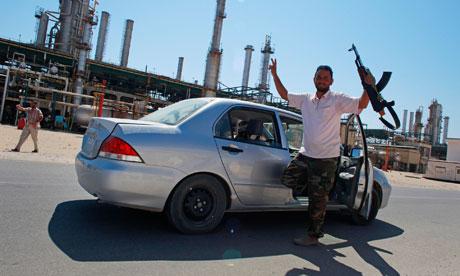Capital faces onslaught from south, east and west as rebel commanders say they have made significant advances.

A fighter gestures after rebels seized full control of the Zawiyah oil refinery. Photograph: Bob Strong/Reuters
Muammar Gaddafi's 41-year grip on power in Libya looked more precarious than ever on Friday night, as rebel forces advanced on the capital from three directions after breaking out of the once-besieged town of Misrata.
With rebels taking control of the coastal town of Zlitan in the east, those in the west claimed to have made progress clearing out the last pro-Gaddafi troops from Zawiyah, 30 miles west of Tripoli. They now have the main coastal road under pressure on both sides of the capital and also under threat from the Nafusa mountains.Gaddafi's army outside Tripoli is trapped in a series of besieged and shrinking enclaves, with rebels controlling more than two thirds of the country. And as the stranglehold on the capital tightens, plans are being made to evacuate the last remaining foreign workers by sea.
It was a day of heavy street fighting in Zlitan, where rebels from Misrata came up against tanks and troops from the 32nd brigade commanded by Gaddafi's son Khamis. Thirty-five rebel troops were killed and scores more injured.
By Friday night, however, opposition leaders said they had taken control of the city 100 miles east of Tripoli. They said their column had reached the outskirts of Al Khums another 30 miles along the coast.
Al Khums commands the last significant road junction before the capital. Rebel spokesmen in Misrata said their forces were now in a valley not far from the town. "Zlitan is now under thwar [revolutionary] control," said Ali Gliwan, spokesman for Misrata's military council. "Misrata thwar linked with the Zlitan thwar. They are now establishing control of the town."
At Misrata's Mujamma Aledad hospital, bloodied bodies of the wounded and dead rebel fighters filled the corridors. "It's a big rush, many martyrs," said Dr Jamal Mustafa, sitting exhausted on a gurney. "Some of the faces, three of them we cannot recognise."
He said wounded fighters had told him government troops had hidden rocket launchers inside buildings to ambush fighters as they pushed into the town. "The bloody bastards, they hid in the houses, they know we [rebels] will not shoot at the houses for fear of killing civilians."
A large crowd of relatives and blood donors gathered at the hospital. One elderly woman in black was guided through the crowd, wailing and shrieking that her son was wounded. "I wish for God to take Gaddafi," she shouted. "I wish for God to take him."
The latest rebel advance came amid reports that the Tripoli compound of Gaddafi's brother-in-law and intelligence chief, Abdullah Senussi, had been destroyed by a Nato airstrike according to neighbours at his house which was hit overnight.
There was no word on whether the intelligence chief was inside.
In the west of Libya, rebels were reported to have seized the centre of Zawiyah after a fierce onslaught by regime forces. They were poised to move towards the coastal town of Janzur on the outskirts of the Libyan capital.
Fighters also told the Guardian they would advance on Zuara, one of the few remaining western coastal towns still under government control, in the next "three or four days" .
After recent rebel advances on the capital from the south and west – and now the east – an international sea evacuation is being considered for thousands of Egyptians and other foreigners trapped in Tripoli. A spokeswoman for the International Organisation for Migration, Jemini Pandya, said the operation would begin within days. "We are looking at all options available, but it will probably have to be by sea," she told a Geneva news conference.
There were estimated to be 1.5 million to 2.5 million foreigners, mostly Asian and African migrant workers, in Libya but more than 600,000 have fled the country during the six months of fighting.
However, many thousands remained in Tripoli which, until this week, was far from the fighting and is a two-hour drive from the Tunisian border.
Earlier in the war the IOM evacuated thousands of foreigners trapped by fighting in Misrata, though it is unclear how many eligible evacuees are in Tripoli, or whether the authorities would cooperate with any evacuation by allowing ships to dock.
Source: BBC News, guardian.co.uk,
No comments:
Post a Comment